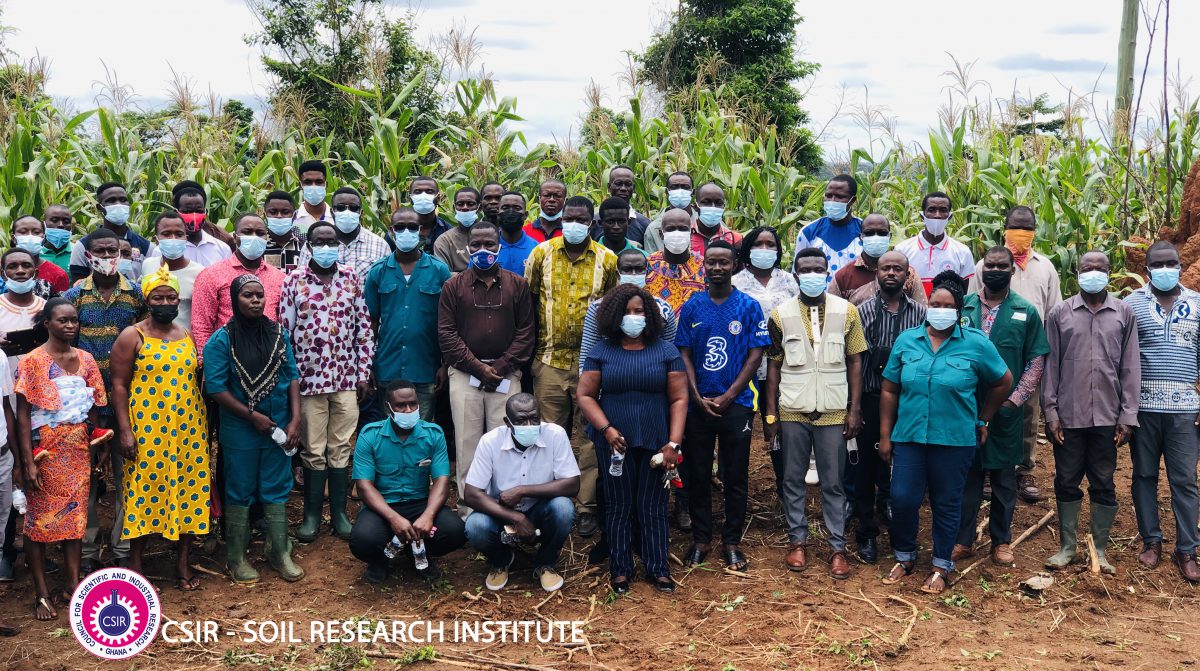CSIR-SOIL RESEARCH INSTITUTE (SRI) SUPPORTS GOVERNMENTS PLANTING FOR FOOD AND JOBS WITH SOIL FERTILITY IMPROVEMENT TECHNOLOGIES TO INCREASE MAIZE YIELDS


The CSIR-Soil Research Institute (SRI) is supporting government flagship programme of planting for food and jobs by rolling out technologies for effective managment of soil fertility for increased crop yield. Soil Research Institute (SRI), is mandated to develop Technologies and Generate Scientific Information for effective managemengt of Ghana’s soil resources for Agriclture, Industry and Environmental sanity, has carried out a demonstration in collaboration with The Ministry of Agriculture (MoFA) and through the Research Extenstion Linkage Committee (RELC) to showcase some of it’s soil fertility managment strategies to increase maize yield in Biokrom, near Bechem Municipality in the Tano South District.
The programme is sponsored by the Government of Canada through Modernizing Agriculture in Ghana (MAG). According to Dr Edward Yeboah, the Acting Director of SRI, “the growth and yield of every crop, including maize is strongly influenced by soil fertility management put in place.
“A fertile soil is able to supply the necessary plant nutrients in adequate amounts for growth and development of the crop. A fertile soil is therefore necessary for better growth and yield of maize, ‘he said.
Dr. Yeboah again told the farmers that, effective soil’s fertility management is one of the most important factors for improving productivity and increasing maize crop. Unfortunately, our soils are unable to supply the much-needed plant nutrients in adequate amounts due to both artificial factors – such as removal by crops (nutrient mining), weeds, leaching, erosion etc. and natural factors.
Dr Emmanuel Dugan, a Research Scientists at the Soil Research Institute (SRI) and also a focal person for the project, praised the Government of Canada for providing financial support through Modernizing Agriculture in Ghana (MAG) Programme and teaming up with the CSIR-Soil Research Institute to roll out sustainable soil fertility and water management technologies for maize production particularly through field demonstrations, to help address the rapidly declining levels of soil fertility and help improve / increase yields in Ghana. The technologies for soil fertility improvement include:
- Biochar (a soil conditioner that helps to conserve both soil nutrients and moisture);
- Organic fertilizers (poultry manure compost) for soil fertility improvement and moisture conservation;
- Mineral fertilizer; a new fertilizer blend (NPK 15-20-20 + Zn) specifically developed and recommended at 90-60-60 kg ha-1 by the CSIR-SRI for the transition and part of the semi-deciduous agroecology.
The introduction of new fertilizer blends and biochar (as soil conditioner) to maize do, not only increase soil nutrient for the crop but also, improve uptake of the applied nutrients and soil moisture retention.
“Application of organic sources such as poultry manure, help to boost the crops nutrition thereby increasing the yield and believed that these technologies will be adopted across the Ahafo region and far beyond for the improvement of maize production, he added.